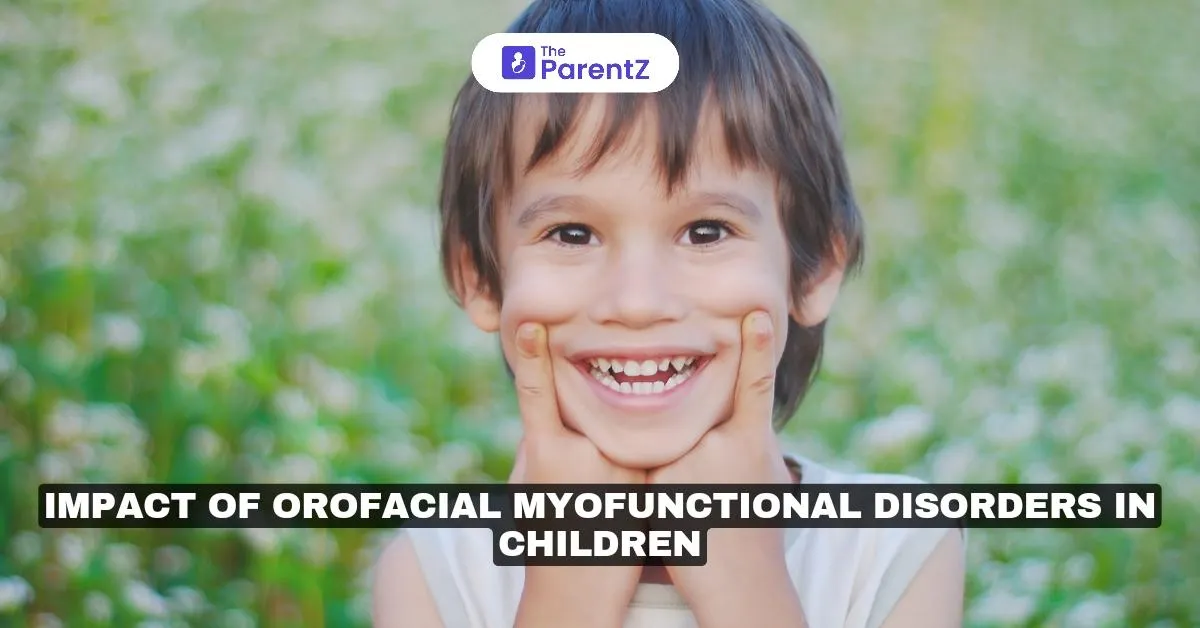Orofacial Myofunctional Disorders (OMDs) refer to abnormal patterns of muscle function and habits involving the face, mouth, and tongue. These disorders can interfere with a child’s oral development, speech, and even their overall well-being. Common examples include tongue thrusting, mouth breathing, and improper swallowing patterns.
Why Are OMDs a Concern?
OMDs can disrupt normal growth and development in children, leading to:
• Speech delays or articulation issues.
• Misaligned teeth or malocclusions.
• Difficulties in chewing or swallowing.
• Changes in facial appearance.
Causes of Orofacial Myofunctional Disorders
Understanding the root causes can help in early diagnosis and prevention.
Common Causes:
1. Thumb Sucking or Pacifier Use: Prolonged habits may push teeth out of alignment.
2. Chronic Mouth Breathing: Often due to allergies, nasal blockages, or enlarged tonsils/adenoids.
3. Neurological or Developmental Delays: Affecting muscle coordination.
4. Poor Oral Posture: Incorrect positioning of the tongue and lips.
5. Structural Abnormalities: Such as a tongue-tie (ankyloglossia).
Signs and Symptoms of OMDs in Children
Parents and caregivers should watch out for these signs:
• Speech Issues: Lisping, difficulty pronouncing certain sounds.
• Feeding Problems: Difficulty chewing or swallowing food.
• Mouth Breathing: Habitual open-mouth posture.
• Dental Misalignments: Overbite, open bite, or crossbite.
• Tongue Thrusting: Pushing the tongue against the teeth when speaking or swallowing.
Real-Life Incidents Highlighting OMDs
1. Speech Delay in a 5-Year-Old: A child with tongue thrusting struggled with “s” and “z” sounds. After early intervention, including speech therapy and orthodontic care, they achieved normal speech patterns.
2. Chronic Mouth Breather: An 8-year-old with undiagnosed allergies developed a narrow palate and required extensive orthodontic treatment to correct their bite.
Managing Orofacial Myofunctional Disorders
Do’s:
1. Encourage Nose Breathing: Teach your child to breathe through their nose. If nasal issues persist, consult an ENT specialist.
2. Early Intervention: Seek a pediatric dentist or speech therapist at the first signs of OMD.
3. Promote Proper Tongue Posture: Encourage your child to keep their tongue resting on the roof of their mouth.
4. Use Orthodontic Appliances: When advised by a dentist, these can guide proper oral growth.
5. Maintain Oral Hygiene: Brush and floss regularly to avoid complications like cavities.
Don’ts:
1. Delay Treatment: Ignoring OMDs can lead to severe orthodontic issues.
2. Allow Prolonged Oral Habits: Discourage thumb sucking and pacifier use after the age of 2-3 years.
3. Overlook Feeding Issues: Difficulty in chewing/swallowing requires immediate attention.
How to Take Care of a Child with OMDs
1. Regular Dental Check-Ups: Ensure routine visits to monitor oral and facial development.
2. Involve Specialists: Collaborate with speech therapists, orthodontists, and myofunctional therapists.
3. Exercises: Include exercises to strengthen oral and facial muscles.
4. Balanced Diet: Provide a diet with chewy, fibrous foods to improve oral muscle function.
A Note for Parents
As a parent, your role is pivotal in identifying early signs of OMDs and seeking timely care. Remember, untreated OMDs can affect your child’s self-confidence and quality of life. Encourage positive habits, ensure proper guidance, and consult professionals when needed.
Final Thoughts
Orofacial Myofunctional Disorders in children are manageable with early intervention and consistent care. By staying proactive, you can ensure your child’s oral health and developmental milestones are on track.





Be the first one to comment on this story.